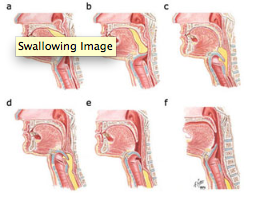Swallowing Treatment
Dysphagia is the medical term for a difficulty with swallowing. Swallowing dysfunction may occur after a stroke, traumatic brain injury or from a progressive neurological disease such as muscular dystrophy, multiple sclerosis, etc.
We recommend a clinical evaluation of the swallow, either with videofluroscopy or FEES prior to making an appointment with our swallow therapist. Therapy is most effective when the function of the swallow is viewed through radiographic methods. A videofluroscopy of FEES study of the swallow must be done through a hospital or approved medical facility.
The major concerns when treating dysphagia are maintaining health through adequate nutrition and hydration and protecting the patient from aspiration and the risk of pneumonia. In addition to treating the patient, the therapist usually makes modifications in the environment and helps the patient and family to select foods and drink that can be eaten safely. Sometimes adaptive equipment is recommended that may include special cups, plates or utensils that will allow the patient to eat more safely and independently.
Our swallowing specialists has extensive experience with stroke, TBI, and muscular dystrophy patients and helping the patient regain their swallowing function. Our therapist will work closely with your doctor in helping you maintain a pleasurable eating experience in spite of a swallowing disorder.
We recommend a clinical evaluation of the swallow, either with videofluroscopy or FEES prior to making an appointment with our swallow therapist. Therapy is most effective when the function of the swallow is viewed through radiographic methods. A videofluroscopy of FEES study of the swallow must be done through a hospital or approved medical facility.
The major concerns when treating dysphagia are maintaining health through adequate nutrition and hydration and protecting the patient from aspiration and the risk of pneumonia. In addition to treating the patient, the therapist usually makes modifications in the environment and helps the patient and family to select foods and drink that can be eaten safely. Sometimes adaptive equipment is recommended that may include special cups, plates or utensils that will allow the patient to eat more safely and independently.
Our swallowing specialists has extensive experience with stroke, TBI, and muscular dystrophy patients and helping the patient regain their swallowing function. Our therapist will work closely with your doctor in helping you maintain a pleasurable eating experience in spite of a swallowing disorder.


